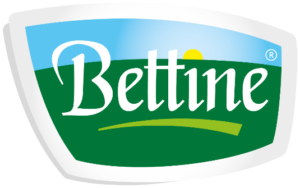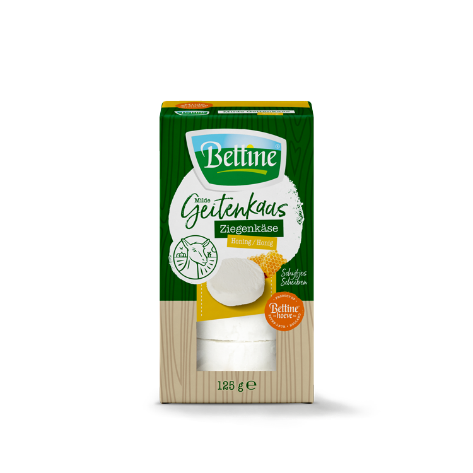Bettinehoeve, a Family Business with a Story

It’s almost impossible to imagine supermarket shelves without Bettinehoeve’s goat’s cheese today. And that’s all thanks to Johan Ewijk who started milking two goats in 1982. He used the milk to make goat’s cheese, which he sold at fairs. After a while, it became clear that the people wanted more, so he was asked if he could supply larger quantities. Johan was enthusiastic and got to work. In 1990, the farmers in the area supplied the milk to Bettinehoeve for the production of goat’s cheese.
Things went well, but in 1992 Bettinehoeve suffered a serious setback: the cheese factory burned down completely. But Johan persevered and opened a new production location on the site of the old farm in 1993, which is still there. In 2007, the second production location opened at the Donk in Etten-Leur, and the third is planned for next year. Nowadays, the whole production takes place under the leadership of General Manager Sybren Ewijk, Johan’s son.
The best cheese in the world

In 1997 Bettinehoeve changed course and started making fresh goat’s cheese and this choice proved successful: in 2006 the hard goat’s cheese, the Bettine Grand Cru, was voted the best cheese in the world at the annual Nantwich International Cheese Show in England! This proves that Bettinehoeve continues to live up to its mission, which has remained unchanged since 1982. What is that mission? “To produce and market tasty goat dairy products from high quality goat milk.”
Changing market: grow, optimise and become more sustainable!
The mission may not have changed, the market certainly has. Remco van Gastel, Manager Production and Technical Services at Bettinehoeve, explains: “The demand for goat’s milk and goat’s milk products is skyrocketing. People are lactose intolerant, or are looking for a different taste experience than that of cow’s milk. In addition, as a supplier you have to respond to trends such as the personal experience of the consumer. We notice that!” Remco also sees developments in the production of goat dairy: “In our area and at other companies we see that further automation but also sustainability is a hot item. Producers want digitalised processes, in order to produce more efficiently and transparently, and the market is demanding more sustainable food production.”
The smart food factory: Producing more efficiently and sustainably with Objective MES
 Bettinehoeve is an innovative company, but not only in its products, as Remco emphasises: “We are constantly renewing our products and responding to the market, but we also want to provide clarity about the origin, quality and sustainability of our products and the process around them, and on top of that guarantee their continuity”.
Bettinehoeve is an innovative company, but not only in its products, as Remco emphasises: “We are constantly renewing our products and responding to the market, but we also want to provide clarity about the origin, quality and sustainability of our products and the process around them, and on top of that guarantee their continuity”.
In response to social developments, Bettinehoeve has invested heavily in automation in recent years. However, the connection between the machines and the ERP system was not yet there. “We had no full insight into the production process and the paper checklists caused many errors and extra work”, says Remco, who had experienced at his previous employer how Objective’s MES solution could help here.
To support the growth in an efficient and flexible way, Remco was able to convince the management of Bettinehoeve to digitize the production and to take the first steps towards the smart goat cheese factory.
Standing still is not an option at Bettinehoeve, which makes it a dynamic company. “That is what I like about working at Bettinehoeve, and that is what we also look for in our partners. Objective is a perfect match, not only because of the culture, experience and dedication of its employees, but also because of the ambition to let Objective’s industry-specific solutions grow together with its customers and thus to continue to deliver future-proof solutions.”
By deploying Objective MES Bettinehove makes the next step towards the ‘Smart Food Factory’.
Objective MES: a scalable solution
Bettinehoeve started a pilot project for 1 packaging line to demonstrate that, with the deployment of Objective MES, the intended objectives can be achieved: Real-time steering of the operation
- Up-to-date and correct insights into the stock of raw materials, semi-manufactured products and end products
- Correct THT registration
- Insight into the write-off of auxiliary materials (Plano’s, sleeves and other materials)
- Reduce errors during registration on the work floor
- Paperless working
- Real-time Track and Trace
- Overall Equipment Efficiency management
On 13 November 2020 the project was kicked off and on 20 April 2021 the pilot line was successfully taken into production, including the links to ERP and the equipment on the packaging line.

“Despite the limitations of Corona, which meant that the Objective team could only support us remotely, and our annual audit in between, it all went very quickly and smoothly,” says Remco, “Together with two Key Users I was trained at the beginning of the project and we were able to do a lot ourselves. Such as training the operators, we did this 1 ½ weeks after which we successfully went live. So successful that I was immediately asked by the operators if we could also do the other lines. However, this is not yet the intention, and although we can already see that it is bearing fruit, we first want to collect the KPIs in the coming period before we take the next step. This will most likely be the Cheese Factory!”
With the successful introduction of Objective MES for the pilot line Bettinehoeve has made the first step. In the coming months the results will be analysed and the approach for the next steps will be planned. In line with the philosophy of Bettinehoeve: Entrepreneurship combined with craftsmanship and Brabant business spirit.

